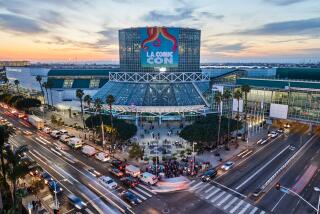In the Economic Future, Entrepreneurs Rule
IN A RECENT CEREMONY AT THE BILTMORE HOTEL, 46-YEAR-OLD Charlie Woo formally took up the gavel as board chairman of the Los Angeles Area Chamber of Commerce. Simultaneously, one of L.A.’s founding prejudices was forever laid to rest and a vision of its future brought into tighter focus.
The elevation of the immigrant from Hong Kong, childhood polio victim and physics doctoral candidate-turned-toy peddler, unlike most intratribal rituals, had the savory smack of wider historicalness. It marked “an amazingly dramatic transformation,” in the words of L.A. business historian Clark Davis of Cal State Fullerton.
A half-century ago, the L.A. chamber was probably the most powerful local chamber in the country. When it came to the development and direction of the Los Angeles region, what the chamber said went.
Its power was exercised, moreover, in service to a racial conceit. “The chamber was a close-knit group of L.A.’s Anglo elite, who viewed L.A. as the Anglo-Saxon metropolis of the nation,” says Davis. “L.A. had the second-largest concentration of racial and ethnic minorities of major American cities, but you’d never have known it from the chamber.”
Reality long ago tugged the chamber from that chrysalis. But until 1994, when Charlie Woo joined the board, its Asian members were mostly foreigners representing large corporations, such as Japanese banks and auto makers.
Woo is the founder of Megatoys, a $40-million-a-year toy wholesaling business, and the father of the Toy District east of downtown. His elevation to the chairmanship is a definitive acknowledgment by the city’s business establishment that L.A.’s economic future is now primarily in the hands of agile, often immigrant, entrepreneurs, no longer of large (increasingly fugitive) corporations.
The impact of that new power, currently fragmented and civically uninvolved, isn’t clear. Woo intends to harness and engage it for that purpose, however.
With his utilitarian office and informal demeanor, Woo would seem to have little in common with the major corporation executive or silk-stocking lawyer. He is not given to neckties, is candid about his business affairs and is a Democrat. He hauls himself laboriously about on metal crutches, the legacy of being stricken by polio as a toddler.
At UCLA in the mid-1970s, he’d started work on a doctoral dissertation dealing with the biological applications of ultrasound. The toy importing business he’d helped his parents launch, however, began sopping up more and more of his time and passion. Entrepreneurial business, it turned out, had more kick than scientific research.
“In physics, you can work on a project for a lifetime and never know what impact it’s going to have,” he says. “In the toy business, you can see whether an idea of yours fails or succeeds in a year or two. I don’t think there’s anything more satisfying than having an idea that becomes a reality and people line up to pay money for it.”
Woo believes that emergent entrepreneurs must involve themselves in civic affairs. It was a lesson he learned a decade-and-a-half ago, while leading opposition to expanded programs for the homeless on skid row, which the merchants of the Toy District uneasily co-inhabit with an estimated 3,000 street-dwellers.
His insistence that standards for publicly tolerated behavior be the same on skid row as elsewhere in the city often has placed him at odds with advocates for the homeless. “The people on the row had nowhere else to go; Charlie Woo had many places to go,” says Alice Callaghan, founder of Las Familias del Pueblo, a skid row day-care center.
Woo also walked point for the chamber in its opposition to the L.A. City Council ordinance mandating a “living wage” for workers employed by city contractors. The ordinance passed 13-0. “You have to speak up, even when you have no chance of winning. Sometimes you can gain respect by losing a political battle. In the end, if people who disagree with you respect you, you avoid a lot of unnecessary conflicts in the future.”
The list of Woo’s civic involvements is a couple of feet long (the board of the Metropolitan YMCA, the L.A. Community Development Bank, the city’s Workforce Investment program and the City Library Foundation, to name a few). He also advises and raises funds for Asian American political candidates.
Woo views multiplicitous, self-contradictory L.A. not as a bloated organism wheezing toward calamity, but as a world power just awaking to its own strength.
“No matter how much trouble we’ve got, this is the capital city of the world for the 21st century,” he says. “No matter how much we complain about it, people are going to come to L.A. and invest in it. People from China and Mexico and Korea know they can make themselves understood here. In one way or another, L.A. has to come together as a community, and the business community, with its diversity, is in a position to set an example.”
More to Read
Inside the business of entertainment
The Wide Shot brings you news, analysis and insights on everything from streaming wars to production — and what it all means for the future.
You may occasionally receive promotional content from the Los Angeles Times.










